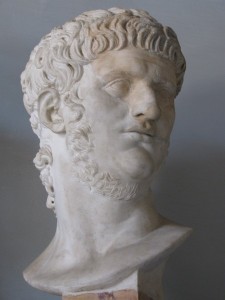It was a tough life for a Roman philosopher in the 1st Century. Gaius Musonius Rufus was a teacher of philosophy in Rome, but his career was cut short when he was exiled by Nero. He returned to Rome after Nero’s death, only to be exiled again by Vespasian a few years later. The danger of philosophy was that not everyone would necessarily agree with your world view, particularly if you taught a pacifist ethos. Annoying the Emperor in 1st Century Rome was a bad idea.
Musonius Rufus tackled a wide range of topics, and perhaps deserves to be remembered for his positive view of women. One of his discourses is titled That Women Too Should Study Philosophy. However, surely his most deeply meaningful, thought-provoking opinions that speak volumes to us today are contained within his discourse… On Cutting the Hair.
It used to be said that a man should cut the hair from the head for the same reason that we prune a vine, merely to remove what is useless. But just as the eyebrows or eyelashes, which perform a service in protecting the eyes, should not be cut, neither should the beard be cut from the chin (for it is not superfluous), but it too has been provided for us by nature as a kind of cover or protection. Moreover, the beard is nature’s symbol of the male, just like the crest of the cock and the mane of the lion; so one should remove the growth of hair that becomes a burden, but nothing of the beard; for the beard is no burden so long as the body is healthy and not afflicted with any disease for which it is necessary to cut the hair from the chin…
Therefore the hair should be cut only to get rid of too much of it and not for looks, as some think they must, those who shave their cheeks and imitate the beardless or, would you believe it, boys who are just beginning to grow a beard, and the hair on the head they do not cut all in the same way, but differently in front and behind. In fact, what seems good-looking to them is quite the opposite and does not differ from the efforts of women to make themselves beautiful. For they, you know, plait some parts of their hair, some they let fall free, and some they arrange in some other way in order to appear more beautiful. So men who cut their hair are obviously doing it out of a desire to appear handsome to those they wish to please, and so some of their hair they cut off completely, some they arrange so as to be most pleasing to the women and boys by whom they want to be admired. Nowadays there are even men who cut their hair to free themselves of the weight of it and they also shave their cheeks. Clearly such men have become slaves of luxurious living and are complete wimps, men who don’t mind being seen as feminine creatures, hermaphrodites, something which real men would avoid at all costs. How could hair be a burden to men? Unless, of course, one should say that feathers are a burden to birds also.
So there you go. If you want to live life the Musonius Rufus way, grow a beard.
A note about the translation above: Latin often tends to be translated in a rather stilted fashion, but that’s just a personal opinion. I am sure plenty would disagree! I have taken the liberty of adjusting the translation slightly for a more natural style of English (doubtless something that lost me a few marks in my Latin exams!)



Reblogged this on First Night History.
LikeLike
Thanks for the reblog!
LikeLike